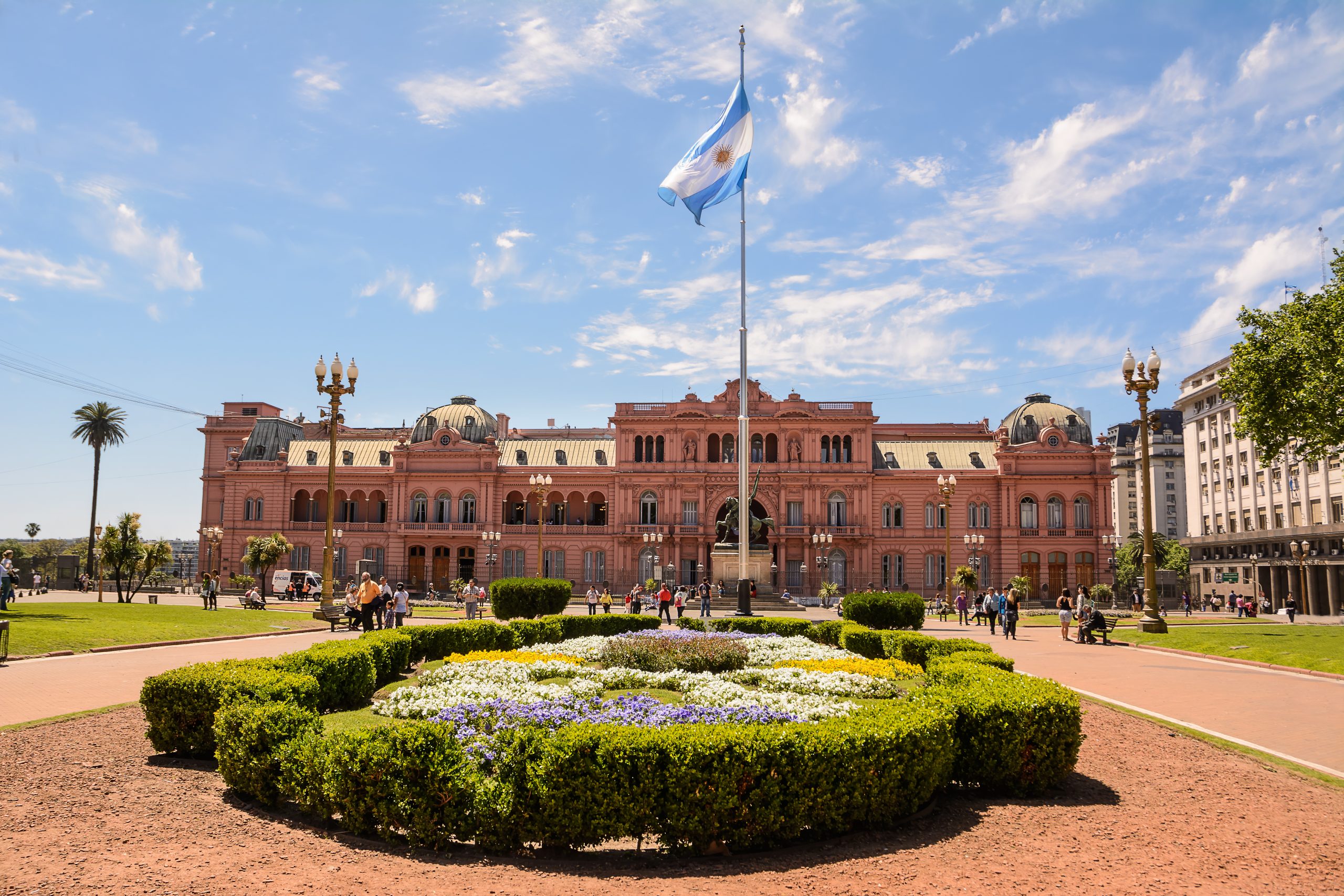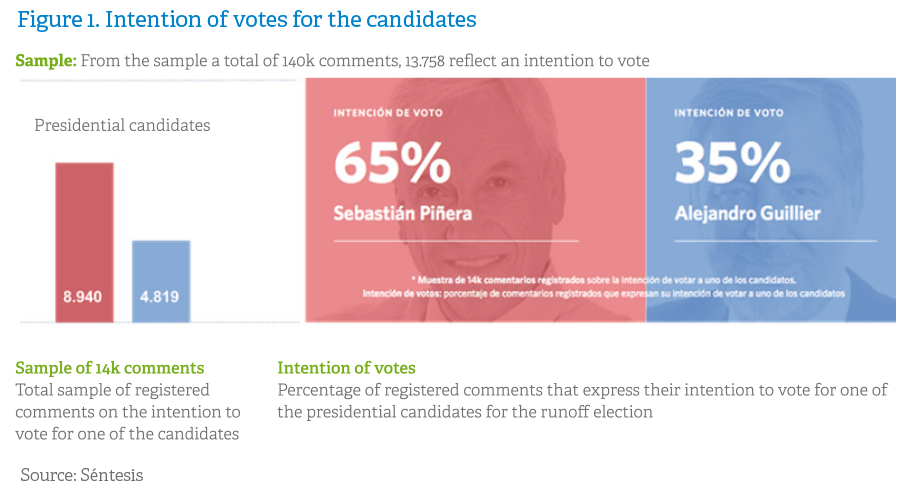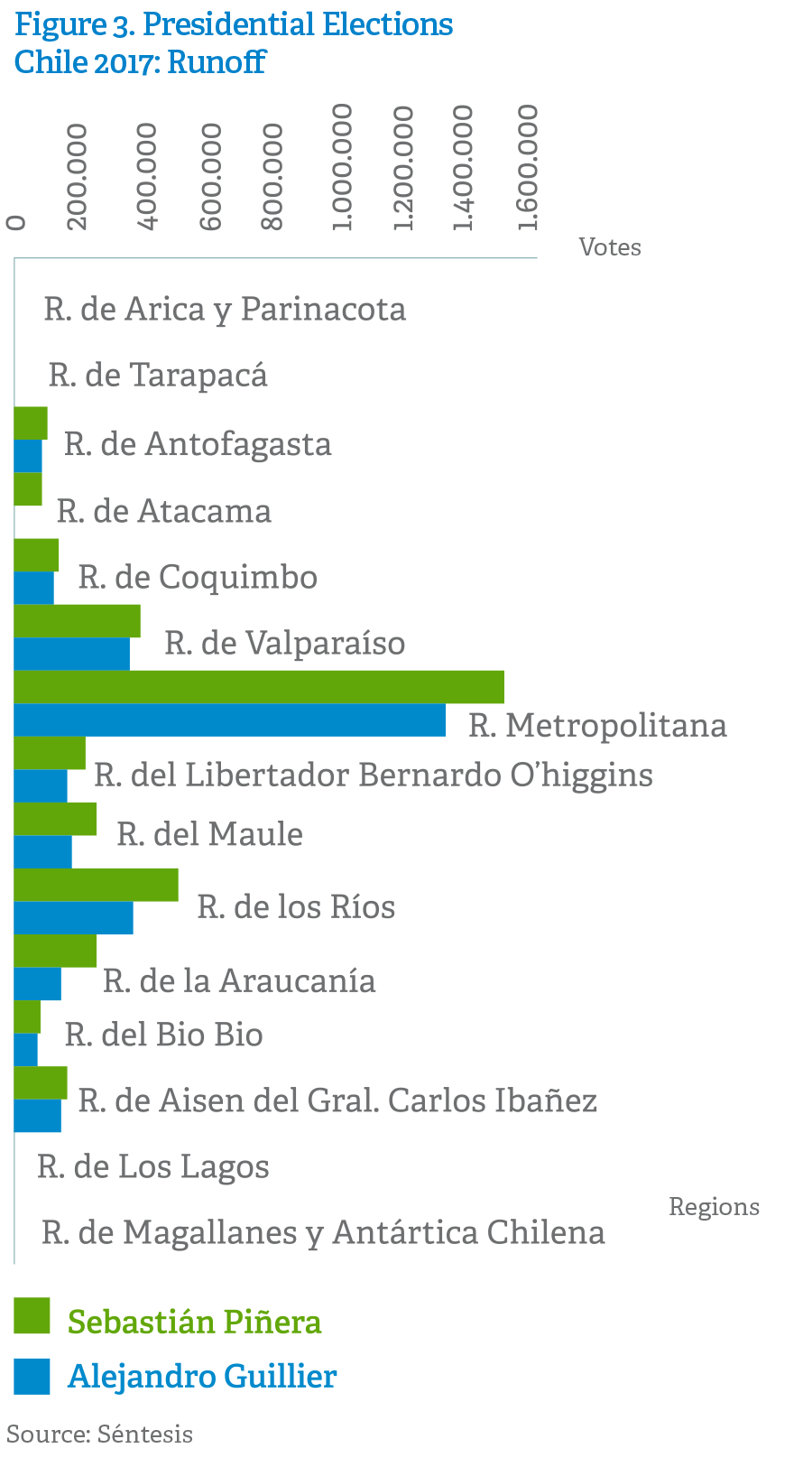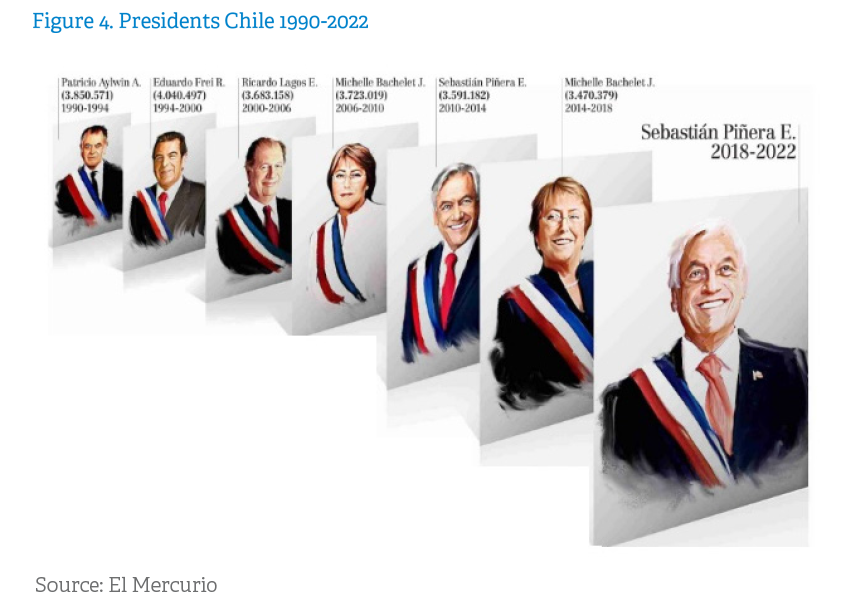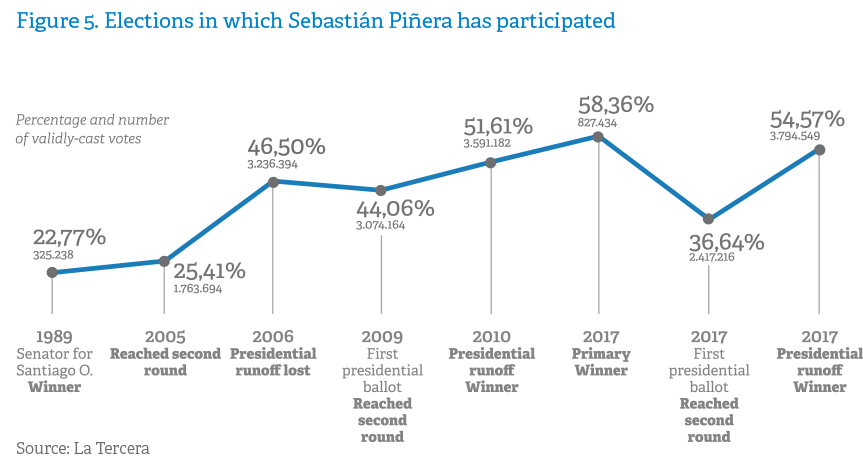An election that redefined the political roadmap in Chile
Last Sunday, December 17th, Chile faced its presidential runoff, in which the candidate of Chile Vamos and former president Sebastián Piñera, won 54.57 percent of the votes, with only nine points of difference over his rival of the Fuerza de la Mayoría, Alejandro Guillier. Despite his victory, Piñera will have to reach agreements to fulfil his government plan, since the Congress is divided. In this study, we analyse the key aspects of the electoral contest and the challenges that the new government will face.
The results of the first round of the presidential elections, in which Sebastián Piñera (Chile Vamos) and Alejandro Guillier (Fuerza de la Mayoría) went to the ballot, leaving several interesting aspects to analyse.
One of the most important is the relevance acquired by the Frente Amplio (FA), a conglomerate that supported Beatriz Sánchez as a presidential candidate in the first round (and who obtained 20.28 percent of the votes), establishing herself as a new political force of the country, and achieving a total of 20 deputies and one senator. This situation rearranges the Congress that consisted of legislators of the Nueva Mayoría and Chile Vamos. Thus, once the new parliamentarians begin their functions -in March 2018-, the president must seek agreements with the FA to carry out his proposals.
As a result of this, and facing the strategy for the runoff elections, both Sebastián Piñera and Alejandro Guillier had to achieve the greatest number of followers of the candidates who were on the road, a situation that was not entirely easy, due to the marked existing programmatic differences between them. Although there were public and tacit support such as that of José Antonio Kast to Piñera and Marco Enríquez-Ominami to Guillier, Carolina Goic (DC) delayed making her choice public and Beatriz Sánchez did not give her support to any of the candidates, wanting to be detached from both coalitions.
This panorama made us anticipate a polarized, close and very close election for both, added to a high abstention and an undecided index of votes, blank or null also high.
How did both candidates arrive at the final round of election?
The unexpected results for Piñera
Although Piñera’s command hoped to lead the election, the internal analysis was far from happy, since the results (36.64 percent of the votes in the first round) were far from the projections made. Chile’s standard-bearer Vamos could not overcome the threshold of 40 percent that had self-imposed and achieved 700 thousand fewer votes than in the first round of 2009, something that was beyond his forecasts.
This situation led Piñera to make an explicit nod to José Antonio Kast, an independent right-wing candidate who won 7.89 percent of the votes in the first round, and who surely took away more than one vote in the election. Additionally, for fortune of the former president, after the projections, he gave his unconditional support to the campaign and promised to travel around the country to campaign for him. “We will not go wrong, we will not be confused, we will not be irresponsible”, he said, calling all his supporters to vote for Piñera “to beat the left in the runoff elections.”
Another important support that was added to the campaign of the candidate of the right, was the support -with conditions- given to him by the senator and former presidential candidate, Manuel José Ossandón (RN), who has a great drag in areas where Piñera did not win (Puente Alto and Pirque communes, for example), and helped him campaign to improve voting in those sectors where the left dominated.
The gratuity in education was a key issue to obtain the support of Ossandón and thus unify the sector around his candidacy, looking for the key votes to prevail against Alejandro Guillier. “We talked with Senator Ossandón and we are going to go a step further: we will extend the gratuity, but privileging professional technical students, who are almost half of the students of higher education and who come from vulnerable and middle class families”, said Piñera.
Finally, Piñera took advantage of the excellent results obtained by Senators Felipe Kast (Evópoli), Francisco Chahuán (RN) and Juan Antonio Coloma (UDI) in the last parliamentary elections, to add them to his command and thus enhance the work in the field in the regions where they were chosen by the people. “They represent the majorities obtained in the polls, which will allow us to join forces to get back to La Moneda,” said Piñera.
Guillier with less support from the left
Like Sebastián Piñera, the candidate of the Fuerza de la Mayoría, Alejandro Guillier, did not contemplate the high percentage obtained by the Frente Amplio (FA) candidate, Beatriz Sánchez (20.28 percent). While his progress during the runoff elections was never in doubt, the percentage achieved (22.70 percent) is far from what was expected by the senator from Antofagasta.
For this reason, an important part of this second stage of the campaign was focused on seducing the FA voter, who defines himself as an opponent of Sebastián Piñera and the traditional center-left, values that Guillier represented as the pro-government candidate.
Guillier had to take into account some of his government proposals to get closer to the electorate. This occurred because the left-wing gave freedom to elect its voters. However, he clearly urged them not to do it because of Sebastián Piñera.
On the side of Guillier’s command, there were hints in terms of free education and ending with the Pension Fund Administrators (AFP). However, its program chief, Osvaldo Rosales, ruled out a pay-as-you-go pension system, as they proposed, making it clear that they will not give in to all the proposals in that sector. Furthermore, this adds up to the refusal to raise the tax to the richest 1 percent of the population: “It is not as easy to implement as they believe. These things sound good, they are good for bronze, but they do not serve the purpose of making public policies”, said Guillier’s team.
The bid to achieve that these votes were transferred was complex, even more taking into consideration that Guillier also received the support of the Christian Democracy and its ex candidate Carolina Goic, who differ in several points with the Frente Amplio.
Under this logic, after the national council made by the post-first round match, it was decided to support the candidacy of Alejandro Guillier in the ballot. “Aware of what is at stake in this presidential election and assuming our historical responsibility to the people of Chile, the Christian Democrats declares their support for the candidacy for the Presidency of the Republic of Alejandro Guillier”, said Matías Walker, interim president of the party (in replacement of Goic), who days later resigned to the position, accusing lack of confidence in the coalition, instead, Miryam Verdugo, second vice president assumed.
On the contrary, it was what happened with Marco Enríquez-Ominami (MEO). Although the Progressive Party candidate was one of Guillier’s main critics, he did not hesitate to pass on his support once the first round was over. “I call to vote for Guillier to stop Piñera,” he said, joining the campaign against the candidate of the right. Via Twitter, MEO stressed that “the center-left already has a winner, congratulations to Guillier. I admit that I will vote for him in the runoff elections, and I put myself at his disposal. I am a soldier, a soldier who is not afraid of Sebastián Piñera. ”
Polls projected a tight triumph of Piñera
Despite the discredited left after the first round, the polls continued with their projections for the ballot. This time, yes, the analyses were more cautious in relation to the projections.
According to Cadem, Sebastián Piñera would obtain 40 percent of the votes against 38.6 percent of Alejandro Guillier, which from the statistical point of view means that the election would be virtually tied, since the difference of 1.4 percentage points between two candidates is within the “+/- 2.6 percentage points” of the margin of error.
On the other hand, the November edition of the Criteria Research survey indicated that the intention to vote for this election marked a preference for the Chilean candidate Vamos, Sebastián Piñera. In the total sample of the poll, 47 percent of the voters were inclined for the candidate of the right and 45 percent for Alejandro Guillier, while 8 percent indicated that they would vote null, blank or would not vote.
Meanwhile, in our Digital Political Barometer published four days before the election, Piñera led the way in voting, but Guillier was better valued according to social networks. Chile’s candidate Vamos collected more comments regarding voting intention with 8,940 mentions (65 percent) versus his contender with 4,819 (35 percent).
A triumph of the Chilean history
It is worth noting that this was a unique election for several reasons, and one of them has to do with an irrefutable electoral result before only two hours passed since the counting of votes began, and that is the clarity of the votes as The tables were scrutinized, leaving the result very clear. With this, Sebastián Piñera became the most voted president-elect in 24 years, giving Guillier an unexpected advantage for all.
In addition, the abstention was against all prognosis lower than expected, since more people voted than in the first round; 7 million people That is, it was an indisputable and indisputable triumph. The analyzes began on Sunday night to understand what happened in this presidential race, which culminated with a result more similar to what were the first projections, almost a year ago.
It is evident that the right also managed to mobilize more to its voters, as interesting fact Piñera took more votes than the election of 2009 and even more than Michelle Bachelet in 2013, which is worth analyzing.
Another noteworthy fact is that the republican tradition of congratulations and gratitude on the part of the protagonists of the night was respected: Sebastián Piñera, Alejandro Guillier and Michelle Bachelet, who greeted each other fulfilling this old and cordial rite that was thought lost after the rough and aggressive presidential campaign.
As expected, the stock market had a strong rise after the triumph of Sebastián Piñera due to the favoritism of the market by the candidate of Chile Vamos and the uncertainty prior to the runoff elections. After 10:00 in the morning, the Selective Stock Price Index (IPSA) registered an increase of 7.4 percent, reaching 5,622.04 points.
The “Piñera effect” predicts that the IPSA could reach around 5,800-6,000 points in the next 12 months. The dollar also recorded movements, with a sharp drop due to the strengthening of the peso, down 2.11 percent, which is equivalent to more than 10 pesos.
Sebastián Piñera: “The road to the best times will not be easy”
“Relax, let’s wait for the results,” said Piñera, as the tables closed at the polling stations and officialized the first counts. Is that while there was confidence in achieving a victory that would take him a second time to La Moneda, the lesson learned from the first round, where a broad victory was predicted, took a deep toll on Chile’s candidate Vamos.
For the same reason, he wanted to take it calmly, although that skepticism was disappearing as more concrete results were known that indicated the tendency that he and his command expected: after seven in the afternoon, the projections indicated that the difference with Alejandro Guillier It would be greater than expected.
54.57 percent of the votes were an unthinkable result for Piñera himself, his command and the specialists. In total, there were 3,795,896 votes that allowed the former president to win the election, which places him as the president with greater support among those who had to settle their victory in the runoff elections, obtaining almost the same vote as Patricio Aylwin, the first president-elect since the return to democracy, and 300 thousand fewer votes than Eduardo Frei (1994-2000). In addition, he will become the first center-right Head of State who returns to govern since Arturo Alessandri Palma did it in 1932.
Piñera took time to personally thank for the support provided by his main advisers, former candidates (José Antonio Kast, Felipe Kast and Manuel José Ossandón) and new parliamentarians, prior to the final speech of the campaign.
Gracias a cada chileno y chilena que confió en nuestros sueños, proyectos y equipo para traer Tiempos Mejores para todos. Seré el Presidente de la unidad, cambio, progreso, esperanza y del futuro. Gobernaremos para todos y nadie se quedará atrás. Gracias y mil veces gracias 🇨🇱 pic.twitter.com/TVhwHmCVJ4
— Sebastian Piñera (@sebastianpinera) December 18, 2017
Surrounded by his family, Piñera gave lights of what he is looking for in his new period at the head of the country: unity. “We will work for a commitment to the unity of all Chileans, a commitment to dialogue and agreements (…). I want to invite all those who have had the privilege and honor of being president of all Chileans to receive their wise and generous advice and share their valuable experiences, “he said.
Going deeper, he stressed that “we can think differently, live differences, live the pluralism of ideas, but those differences should never make us enemies. Every time we Chileans have faced or we have seen ourselves as enemies, we have reaped our great defeats. ”
Despite the emotion of the moment, Piñera knows that he will have to deal with a Congress where the center right does not have the majority, so he will be forced to seek agreements to be able to comply with the proposals of his government plan. “Making good government depends on everyone, including those who voted for Alejandro Guillier. We have to unite more than ever, because we have a demanding mission to fulfil, because there is a new world hitting our doors, and because the road to the best times will not be easy “.
Alejandro Guillier fails to give continuity to Bachelet’s legacy
Guillier’s collaborators were quite enthusiastic in the command of the pro-government candidate, prior to the beginning of the vote count, confident that he would be chosen as the next president of Chile, and his words made him notice in the days before the election. vote. “I think we’re going to win by a clear difference. Not so millimetric. Narrow but clear”he said.
However, the calculations were wrong. And not only because finally his contender was the one who proclaimed himself the winner of the ballot, but also because of the wide difference with which he did it. As the results were updated, the senator from the Antofagasta region was convinced that it was increasingly difficult to succeed. And it was not until 8:00 pm on Sunday, December 17, that he assumed defeat. The 3.1 million votes obtained – the worst result of a center-left candidate in the ballot – prevented him from being the continuator of the multiple reforms of the government of the president, Michelle Bachelet.
Guillier added that he had suffered “a painful defeat, but I invite you to learn from the election, to study the results of the citizen vote and to reconstruct a democratic option, a solidary option for Chile based on the principles of solidarity, freedom and equal opportunities ( …) But we must also be self-critical: we have suffered a hard defeat and defeats is where we learn the most. We have to lift our spirits and go out to defend the reforms we believe in. ”
With the pain of having lost, and after visiting and congratulating Sebastián Piñera on his victory, the senator called for the unity of progressive forces, inviting “to learn to articulate with new political forces and new leaderships that are emerging to unite – and not only in the political parties, also in the social movements -, so that the reform agenda is at the heart of the management of the next government “.
Gracias al pueblo chileno y a las millones de personas que nos entregaron su confianza. Pero esto no se acaba. Seguiremos adelante luchando por los derechos sociales. A estar tranquilos y con la frente en alto, ya que sin duda dimos todo por nuestros ideales. Millones de gracias! pic.twitter.com/nMas55mTfO
— Alejandro Guillier (@guillier) December 17, 2017
The reinvention of the Nueva Mayoría
After the defeat of the candidacy of Alejandro Guillier, there are several changes that are necessary in the Nueva Mayoría to continue projecting as a political conglomerate and the main opposition group to Sebastián Piñera, and not lose his historic legacy, especially with the threat of the rising Frente Amplio (FA).
For this reason, the parties that comprise it will begin with various processes of reflection to renew leadership and define how they manage to rearticulate from the opposition. In addition, they must solve the question that the FA and the Christian Democracy will play in this new process.
In this context, there are several leaders of the still ruling party who are clear that, although Guillier could play a relevant role, he does not have the capacity to lead the reins of the conglomerate during the next four years. From the Radical Party they express that “it is an important leadership in the sector and we have to see how we project it”,
For his part, Guido Girardi, senator of the Party for Democracy (PPD), does not see it as protagonist: “It will be one more, here nobody has a monopoly on the future or on progressivism. We are all from this process. Alejandro did a great job and we’ll see what happens. ”
As important as the previous thing, it is the complex articulation of the forces of the center-left. Within the Nueva Mayoría, the Socialist Party was the one that was in better foot, when achieving 19 deputies and 7 senators, reason why its roll will be preponderant at the time of reorganizing the conglomerate. However, the community must resolve the dilemma that the bloc will face with the most central parties, such as the Christian Democracy, or explore the option of forging alliances with other forces such as the Frente Amplio or the new Progressive Country, formed by the union between Former candidates Marco Enríquez-Ominami and Alejandro Navarro.
A separate chapter is the difficult situation that the PPD is going through, which must be reorganized internally, with a change in the directive and a total restructuring of the party. There is even talk of a change of name and a possible flight of youth leaders that could end up in the Frente Amplio.
The same challenge is posed for the Communist Party, which despite being part of this government, would not look with bad eyes to get out of this pact and seek alliances with the most progressive sectors of the Frente Amplio and the Nueva Mayoría.
Finally, in addition to the PPD, the Christian Democrats must also resolve their internal conflicts and with the government sector to define their future for the next four years, where the choice of a new board, after the resignation of Carolina Goic to the presidency, is fundamental. for a new era. In addition, various theses have arisen related to the party will maintain a political independence, always from the side of the opposition, negotiating autonomously supports in front of each project, without being part of a coalition with the Communist Party.
The role of the Frente Amplio
Establishing itself as a political conglomerate is one of the key tasks of the Frente Amplio, which would allow it, in the future, to be projected in good conditions for the next presidential election. According to Gabriel Boric, one of its young leaders, the objective is to lead a constructive, firm and responsible opposition that works hand in hand with social movements without losing sight of the multiple differences existing with the right.
“We must articulate the alliances that are necessary in a cross-cutting way to advance the demands of the citizens,” said the mayor of Valparaiso, Jorge Sharp, in contrast to some frontistas who believe that the important thing is to defend existing differences with the Nueva Mayoría, betting, even, on the extinction of the block that will govern until March 2018, in order to establish itself as the main opposition group to Sebastián Piñera.
The main challenges that Piñera will face in his second term
An unbalanced Congress, achieving an increase of at least one percentage point of growth, establishing a more political and less technical cabinet, as well as closing any conflict of interest related to his fortune, are some of the main tasks that Sebastián Piñera will have to solve.
His wide advantage over Alejandro Guillier could grant him a period of “grace” during the first 100 days of his administration, although he does not assure him a quiet mandate. “Tonight I can assure you that both Cecilia (Morel) and I and our entire team will deliver the best of ourselves to fulfill our mission, not to disappoint our compatriots, and for Chile to recover the path of progress and development, “said Piñera, after winning the election.
An unbalanced Congress
The structure of political power in Chile changed completely on Sunday, November 19, with the parliamentary elections, since the new electoral system, which replaced the controversial binomial, allowed the irruption of a third force in Congress that broke the traditional duopoly of the Nueva Mayoría and Chile Vamos, two blocks that were fought to dominate since democracy returned in 1990.
With a new correlation of forces, it will have to implement a different government than the one led between 2010 and 2014. Until now, both the NM and ChV blocks shared 96.7 percent of the seats in the Chamber of Deputies and 97.4 percent of the seats. the quotas in the Senate, but that changed with the emergence of the Frente Amplio (FA), even surpassing its own projections, it consolidated itself as the third actor in the Chilean political map. The new correlation of forces left with a relative majority of ChV, which could make it difficult to pass qualified quorum laws in Congress.
Of the 155 seats in the Chamber of Deputies, the NM has 57, the FA with 20, and the Progressive Party (PRO), with one. The three forces of center left add 78 seats, to which four others of the Socialist Regional Federation could be added Green (FREVS). Opposite them, ChV has 72 places, so the keynote will be negotiating.
It will have to negotiate and generate political agreements for each law with more moderate sectors, such as the Christian Democracy, for which the DC will become a very relevant party when it comes to making parliamentary decisions.
Increase growth
He was emphatic in pointing out that his government program had a cost of 14 billion dollars and that half of that figure would be financed by administrative measures such as cuts, reallocations and the exit of “political operators”. The other half would be obtained from a greater trend growth of the economy, which could be impacted by external economic conditions.
According to his estimates, a supposed higher trend growth could go from the current 2.6 percent projected in the 2018 Budget, to 3.5 percent towards the end of his new term, which would allow him to raise those 7 billion dollars with which he seeks finance half of its government program. But raising the growth of the economy at one point is not an easy task.
Going back to higher levels of trend growth of 3percent is complex given the perspectives of the mining sector, according to the agency Moody’s.
Your team is key
Prioritize more collaborators of political profile than technical, will be the slogan. The team that accompanies it should be in this second government less technocratic and more political, unlike the first. Above all, for the conformation of the Congress and the political agreements you will need with a good Minister of the Interior, Treasury and General Secretariat of the Presidency (Segpres). If you establish a political team that knows how to dialogue, negotiate and pursue interests, you will have a possibility to generate proposals.
In addition to his team, he must ensure that his campaign promises are fulfilled, especially those that were flags of struggle and measures more in the center, especially valuation issues and free education.
Avoid conflicts of interest
At all costs, you must specify a blind trust in Chile and another abroad, to avoid the headaches of the first part of your campaign.
In May, after being involved in the so-called Bancard Case, which was born after revealing its investments in the Peruvian fishing company Exalmar, the mining company Dominga, and its partnerships in the British Virgin Islands and Luxembourg, Piñera said it would be subject to a blind trust in the terms that Law 20,880 requires. That is, over all the shares of open corporations and other securities, whether capital or debt, that are issued by entities incorporated in Chile and that are registered in the registries of the Superintendencies of Securities and Insurance (SVS) and of Banks and Financial Institutions (Sbif).
It will also include voluntarily in another blind trust the assets it has abroad. His family took similar measures. His wife, Cecilia Morel, delivered a declaration of interests and patrimony and will submit to a voluntary blind trust “in the same terms committed by me,” Piñera said. Both, in addition, retired in April of the companies in which they were partners with their children, although not of their personal societies.
These commitments should be fulfilled before he assumes the position of president, which would remove pressure in the event of new conflicts of interest.
Authors
Nicole Sternsdorff
Juan Ignacio de la Carrera
